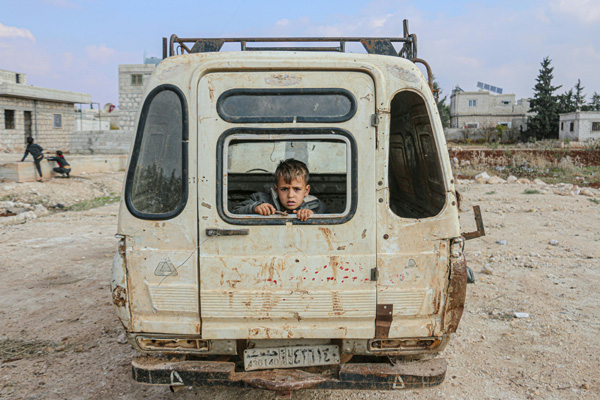Israel and Iran’s shadow war intensifies

[A kid hiding in a van during the war. Photo Credit: Pexels]
On April 1, 2024, Israel launched an airstrike on the Iranian consulate building in Damascus, the capital city of Syria, killing thirteen people, including a high ranking commander of the Iranian Elite Republican Guards.
It is believed that Israel launched the April 1, 2024 attack, as well as several others in Syria, to stop the Iranian Elite Republican Guards from transporting weapons and equipment to strengthen its military presence in Syria.
In response to the attack on the consulate buildings in Syria, Iran launched approximately 170 drones, 30 cruise missiles, and 110 ballistic missiles at Israel (Ebrahim et al.).
Nearly the entire attack, approximately 99 percent, of the attack was intercepted and destroyed before reaching the intended destinations through missile defense systems from Israel and its allies (Berg et al.).
However, five ballistic missiles passed through defenses and landed at an air base in Nevatim, which appears to have been Iran’s primary target (Berg et al.).
Analysts have stated that the attack appeared to be telegraphed and that the aim of the attack was to target military installations and not inflict too much damage or hurt anyone (Qiblawi).
Although it is believed that Israel has conducted multiple covert operations in Iran in the past years, such operations have targeted individuals and infrastructure perceived as security threats, and Israel has never initiated a direct military assault on Iranian soil.
Israel and Iran have been engaged in conflict for years, attacking one another while denying culpability for such attacks.
The two countries were former allies until the Islamic revolution in Iran in 1979, which introduced leadership in Iran that ideologically opposes Israel.
Iran’s leader, Ayatollah Ali Khamenei, seeks to eradicate Israel and has previously claimed that Israel is a “cancerous tumor” that “will undoubtedly be uprooted and destroyed” (Berg et al).
Iran has supported Palestinian and other anti-Israeli organizations, including Hamas, with money and munitions, causing Israel to consider Iran an enemy.
According to Raz Zimmt of the Institute for National Security Studies in Tel Aviv, there is a “very dangerous phase of the Israeli-Iranian confrontation… Iran has certainly tried to change the rules of the game with Israel… We might expect more rounds of direct attacks in the future.”
Israel’s decision to retaliate may be constrained by its allies.
United States President Joe Biden has expressed to Israel that the United States, which was one of the countries that assisted in intercepting the Iranian attack, would not participate in any attack against Iran, stating that the interception of nearly the entirety of the Iranian attack was a huge success and that a retaliatory response would be unnecessary (Ebrahim et al.).
It appears that Israel moved forward with a military response by launching an airstrike near a major air base and nuclear site in Isfahan, Iran.
Israel has yet to confirm that it was responsible for the attack.
However, both Israel and Iran have downplayed the attack, indicating that both sides may be prepared to prevent the back and forth attacks from escalating into an all-out war.

- Yeonwoo(Anthony) Kim / Grade 11
- Crean Lutheran High School

![THE HERALD STUDENT REPORTERS [US]](/assets/images/logo_student_us.png)
![THE HERALD STUDENT REPORTERS [Canada]](/assets/images/logo_student_ca.png)
